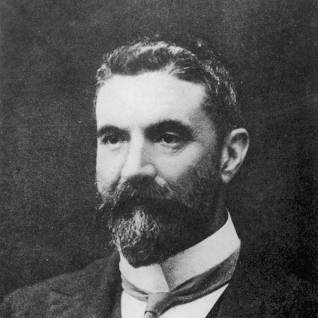Welcome to Monday a day I tell you a little about another famous Australian and this week it is Alfred Deakin.
Alfred Deakin was an Australian politician, statesman and barrister who served as the second prime minister of Australia, from 1903 to 1904, 1905 to 1908 and 1909 to 1910, holding office as the leader of the Protectionist Party, and in his final term as leader of the Liberal Party.
Born in Melbourne to middle class parents on 3 August 1856, he was 23 when he was elected to the Victoria Legislative Assembly while working as a barrister and journalist.
He held ministerial office on and off from 1883, twice serving as Attorney General of Victoria. After federation he was the inaugural Attorney General of Australia.
After 1890, Deakin refused all offers of cabinet posts and devoted his attention to the movement for federation. He was Victoria's delegate to the Australasian Federal Conference, convened by Sir Henry Parkes in Melbourne in 1890, which agreed to hold an intercolonial convention to draft a federal constitution. He was a leading negotiator at the Federal Conventions of 1891, which produced a draft constitution that contained much of the Constitution of Australia, as finally enacted in 1900.
He was the first prime minister to call an early election, to catch his opponents off guard and take advantage of a large number of urban educated female voters who could cast a ballot for the first time.
After the 1913 election, Cook offered Deakin the position of chairman of the Interstate Commission, but he declined. In 1914, following the outbreak of World War I, he did accept a request to chair a royal commission into food supply during the war.
His final public engagement was as leader of the Australian delegation to the 1915 Panama–Pacific International Exposition in San Francisco. He was offered the role initially by Cook and then by Andrew Fisher, who returned as prime minister in September 1914. The appointment was entirely ceremonial and had the support of both Fisher and his deputy Billy Hughes. However,his involvement was subject to political interference from external affairs minister Hugh Mahon, and he decided on an early return to Australia.
The final years of his political career coincided with the decline in his health and memory.
He died at his home on the 7 October 1919.





Which of his policies were appealing to educated females so recently enfranchised?
ReplyDeleteNo bloody idea
DeleteLove your history lessons!
ReplyDeleteThank you
DeleteI knew nothing about Australian politics. Interesting. :)
ReplyDeleteNeither do I, thanks
DeleteA good read Jo-Anne.
ReplyDeleteThank you
DeleteIs Australia's constitution anything like ours here in the States, Jo-Anne? You've got me interested!
ReplyDeleteI don't know but was wondering that myself yesterday as I wrote this post up might have to look into that
ReplyDeleteSounds like a good man. Sorry to hear about his late life struggles.
ReplyDelete